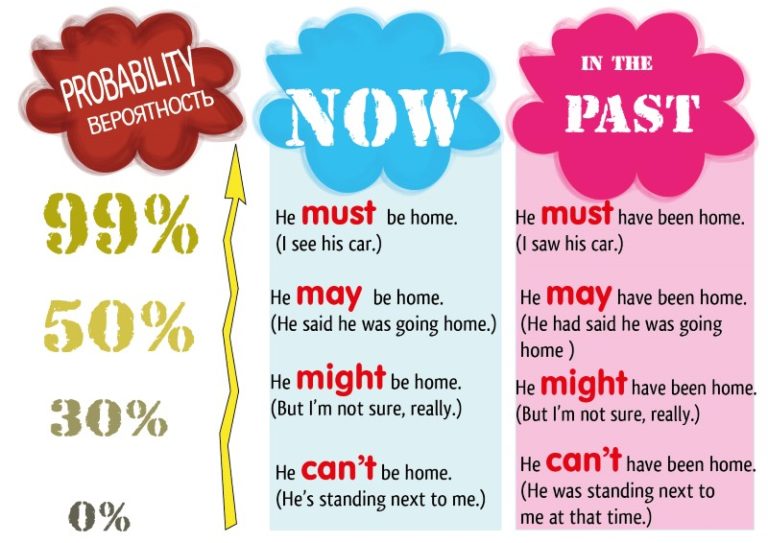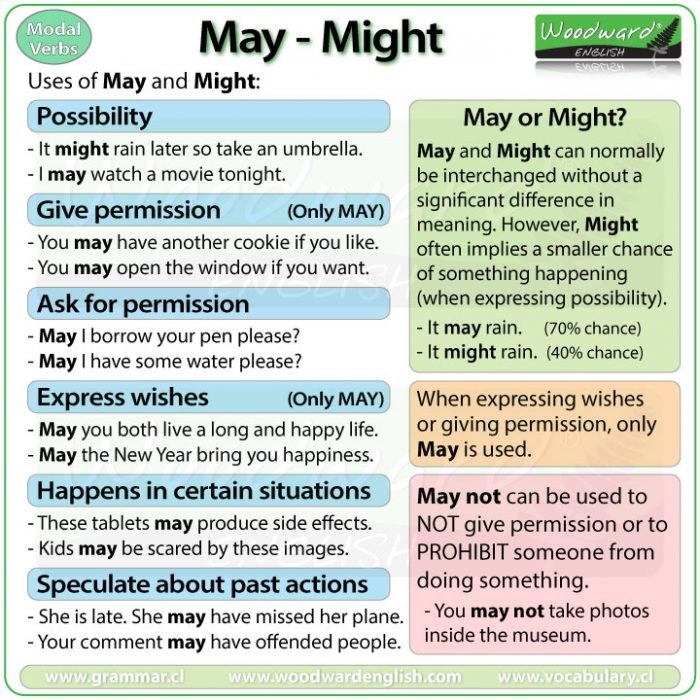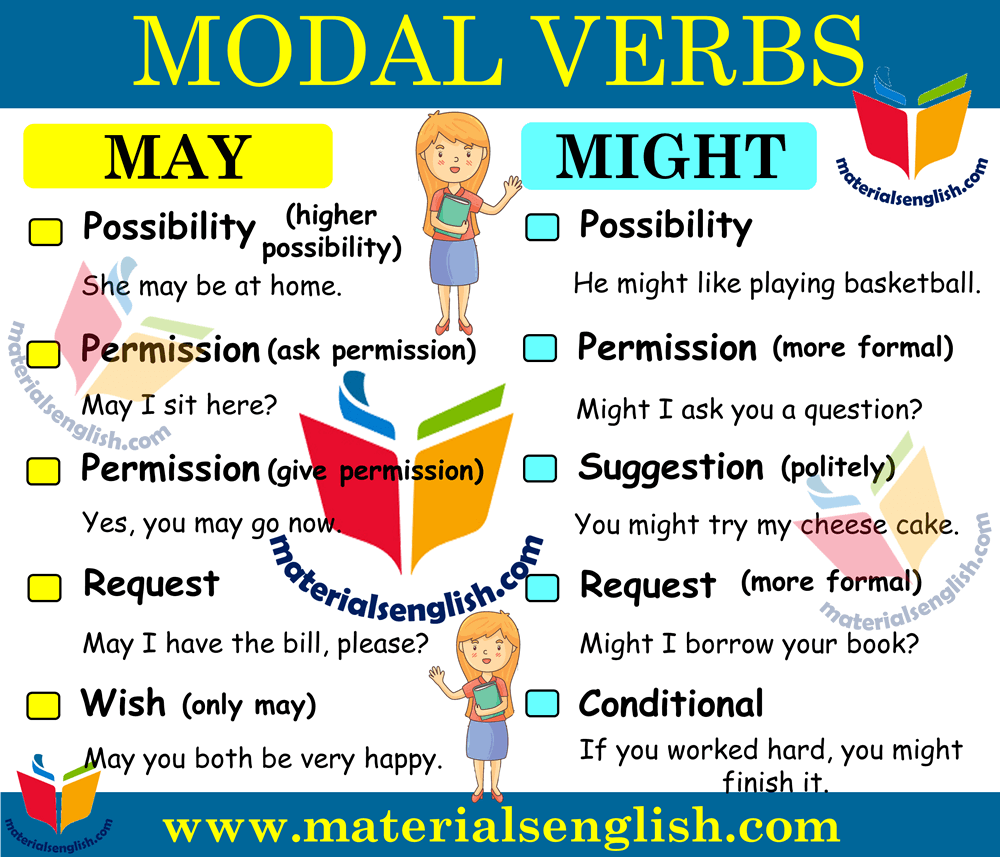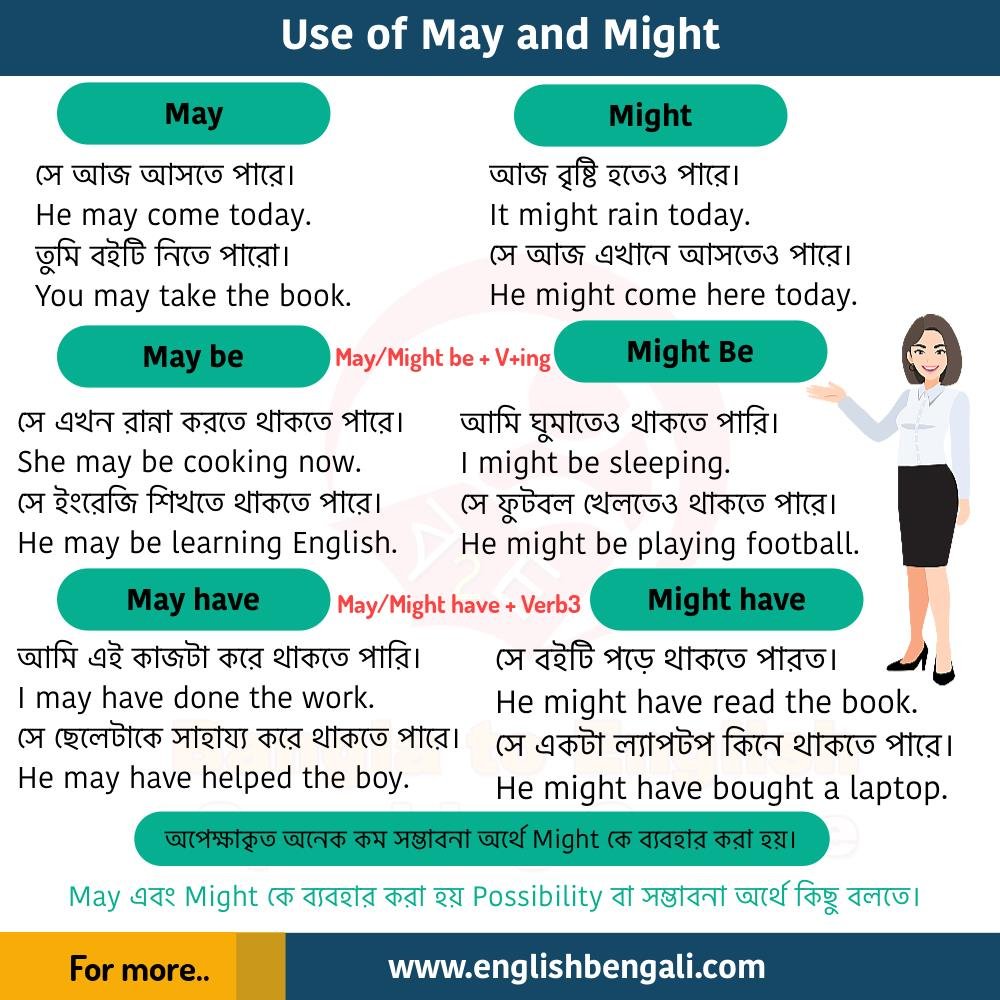
Everyday Grammar May, Might, Must English Tips, English Study, English Lessons, Learn English
Modal verbs of deduction - must, may, might, could, can't Exercise 1 Choose all the correct modal verbs of deduction for each gap below. In some sentences there are TWO possible correct answers. Page 1 of 2 1 Paul is behaving in a very unusual way. I think he ______ again. a. can't drink b. can be drinking c. might be drinking

Expressing Must / Can't / Should / Needn't / Might / May / Could Have
1. "May" or "Might" When It Comes to Tense. When a sentence is in the present tense, the preferred word to use is may: She may join us for dinner. Howard may call you soon. We may go to the party. When a sentence is in the past perfect tense, the preferred word to use is might.

Modal Verbs (Must, can't, may, might, could) worksheet Probability Worksheets, Worksheets For
Modal Verbs Rules: Using the Verbs Must, Have to, May & Might Preply Blog English English grammar The Modal Verbs Must, Have to, May, Might: Rules of Use Model verbs are important in English because they are used frequently daily. You should learn all of them for adapting yourself to everyday language. Larry Jones Updated August 3, 2023 6 min read

Pin on English Language, ESL, EFL, Learn English, Vocabulary and Grammar
must, might/may, could, can't Practise with these fun jumbled modals games EnglishClub : Learn English : Grammar : Verbs : Modal Verbs "Very helpful.very nice.free of charge!" - Ashraf Saber, Egypt Modals: CAN/COULD, WILL/WOULD, SHALL/SHOULD, MAY, MIGHT; MUST, OUGHT (TO). Modal verbs are auxiliary verbs (also known as 'helping verbs').

70以上 should have to must exercises 104898Should have to must exercises pdf Nyosspixi3bq
may/might: possibility or probability: "I might do that later." politeness: " May I ask you something?" permission:

Must, may, might, can’t. Вероятность и предположение в английском языке правило
Certainty, or the belief of certainty, from the speaker. Everyone is wearing a jacket. It has to be cold. Have to is much less formal than must, and is common in conversation. May, might, and could are all used to show possibility in the past. Modal Verb + Have + Past Participle. Must can be used in the same way to show certainty in the past.
MODAL VERBS3 may, might, must VERBOS MODALES3 may, might, must Inglés práctico, gratis
There's a class of helper verbs known as modals that we use to express a bunch of conditions: we can use them to give advice, make guesses at how necessary or likely something is, make requests of people, and so on. They're super useful. Questions Tips & Thanks Want to join the conversation? Sort by: Top Voted Azat 7 years ago Hello!

Learn Modal Verbs Easily will, would, can, could, may, might, should, must [basic English
The uses of "might," "may," and "must" for deductions are important to learn in English. These modal verbs are used to express varying degrees of certainty or probability about a situation or event. Let's explore each of these modals and their uses, along with examples. Might: "Might" is used to express a possibility or a.

May vs. Might When to Use Might vs. May with Useful Examples • 7ESL
Write with Grammarly May vs. might May and might may seem interchangeable, but they aren't. These are the key differences between them: May: Used most often in the present tense Used to describe a probable hypothetical Can be used to give or ask for permission Might: Used most often in the past tense Used to describe unlikely hypotheticals

MIGHT * MAY MUST CAN. Ficha interactiva TopWorksheets
Learn how to use the modals MIGHT, MAY, MUST, and CAN to talk about possibility and certainty in English. A speculation is when you use the evidence in a sit.

May and Might English Modal Verbs Woodward English
can, could, may, might, must, mustn't, should, ought to, shall, will Modal verbs are a type of auxiliary verb which express the mood of another verb. They are used to express ideas such as: possibility, prediction, speculation, deduction and necessity. Modal verbs have the following characteristics:

Modal Verbs Ourboox
Everyday Grammar May, Might, Must - Modals of Certainty June 16, 2016 0:00 0:02:00 Everyday Grammar: May, Might, and Must 0:00 0:06:29 Pop-out player For VOA Learning English, this is.

ENGLISH GRAMMAR COMPARATIVE STUDY MUST MAY MIGHT CAN'T in hindi english YouTube
Grade 4 Verbs May, might & must May, might & must Helping verbs: may, might & must worksheets May, might and must are commonly confused. May is used to express possibility or permission. Might is used to express a smaller possibility. Must is used to express a requirement. Students practice the use of may, might and must in these worksheets.

Use of May and Might May have, Might have English Grammar
1: Talking about the present: must / might / could / may / can't + infinitive For example: I am waiting for Julie with another friend, David. I ask: 'Where is Julie?' David guesses: She must be on the bus. (I'm fairly sure this is a good guess) She might come soon. (maybe) She could be lost. (maybe) She may be in the wrong room. (maybe)

Must and Can’t May and Might British Academy
Juddering, quivering and wobbling: more verbs to describe movement January 03, 2024 Read More New Words broken rung January 01, 2024 More new words To top Contents Could, may and might - English Grammar Today - a reference to written and spoken English grammar and usage - Cambridge Dictionary

May vs Might Learn english grammar, Learn english, Learn english vocabulary
The modal verbs in English grammar are c an, could, may, might, must, need not, shall/will, should/ought to. They express things like ability, permission, possibility, obligation etc. Modal verbs only have one form. They do not take -s in the simple present and they do not have a past simple or past participle form.